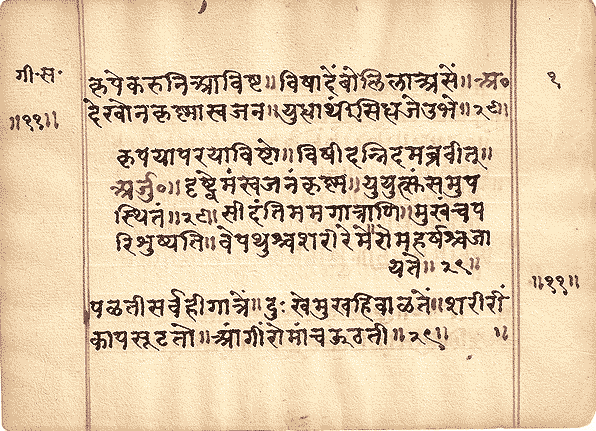BhG 1.28-29
dṛṣṭvemān svajanān kṛṣṇa yuyutsūn samupasthitān
sīdanti mama gātrāṇi mukhaṃ ca pariśuṣyati
vepathuś ca śarīre me roma-harṣaś ca jāyate
syntax
he kṛṣṇa (O Kṛṣṇa!),
imān (these) samupasthitān (assembled) yuyutsūn (those desiring to fight) sva-janān (own people) dṛṣṭvā (after seeing),
mama (my) gātrāṇi (limbs of the body) sīdanti (they sink down),
mukhaṁ ca (and the mouth) pariśuṣyati (it is drying up),
me (my) śarīre (in the body) vepathuḥ (trembling) [asti] (is),
roma-harṣaḥ ca (and bristling of the hair) jāyate (it accurs),
grammar
| dṛṣṭvā | – | √dṛś (to see) absol. – after seeing; |
| imān | – | idam sn. 2n.3 m. – these; |
| sva-janān | – | sva-jana 2n.3 m.; TP: svasya janān iti – own people (from: sva – own; √jan – to be born, to produce, jana – man, people, creature); |
| kṛṣṇa | – | kṛṣṇa 8n.1 m. – O dark one, O Kṛṣṇa; |
| yuyutsūn | – | yuyutsu (√yudh – to fight) des. 2n.3 m.; yoddhum icchataḥ – those desiring to fight; |
| samupasthitān | – | sam-upa-sthita (upa-√sthā – to stand near) PP 2n.3 m. – those assembled; |
******
| sīdanti | – | √sad (to sit down, to sink down) Praes. P 1v.3 – they sink down; |
| mama | – | asmat sn. 6n.1 – my; |
| gātrāṇi | – | gātra 1n.3 n. – limbs, the body; |
| mukham | – | mukha 1n.1 n. – face, mouth; |
| ca | – | av. – and; |
| pariśuṣyati | – | pari-√śuṣ (to dry up) Praes. P 1v.1 – it s drying up; |
| vepathuḥ | – | vepathu 1n.1 m. – trembling (from: √xvip – to tremble, to shiver); |
| ca | – | av. – and; |
| śarīre | – | śarīra 7n.1 n. – in the body (from: √śri – to lean on, to rest on; or from: √śṝ – to break, to crush, śarīra – easy to be destroyed, the body); |
| me | – | asmat sn. 6n.1 – my (shortened form of: mama); |
| roma-harṣaḥ | – | roma-harṣa 1n.1 m.; TP: romāṇām harṣa iti – bristling of the hair (from: √ruh – to ascend, to rise, roma / roman – the hair on the body; √hṛṣ – to be excited, to become erect, harṣa – bristling, erection, excitement); |
| ca | – | av. – and; |
| jāyate | – | √jan (to be born, to produce) Praes. Ā 1v.1 – it occurs; |
textual variants
In some editions before the third pada of the verse there is: arjuna uvāca (Arjuna spoke);
dṛṣṭvemān svajanān kṛṣṇa yuyutsūn samupasthitān → dṛṣṭvemaṁ svajanaṁ kṛṣṇa yuyutsuṁ samupasthitam (O Kṛṣṇa, after seeing his own people, desiring to fight, assembled);
dṛṣṭvemān→ dṛṣṭvemaṁ / dṛṣtvaivaṁ / dṛṣṭvaitān / dṣṭvā saṁ- (after seeing this / thus after seeing / after seeing them);
svajanān→ sujanān / svajanaṁ (good people / own people);
mama → sarva (all);
pariśuṣyati → pariśuṣyate (it is drying up);
mukhaṁ ca pariśuṣyati → mukhaṁ cāpi viśuṣyati (and even the mouth is drying up);
Śrīdhara
kim abravīd ity apekṣāyām āha dṛṣṭvemān ity ādi yāvad adhyāya-samāpti | he kṛṣṇa yoddhum icchataḥ purataḥ samavasthitān svajanān bandhu-janān dṛṣṭvā madīyāni gātrāṇi karacaraṇādīni sīdanti viśīryante | kiṃ ca vepahtuś cetyādi | vepathuḥ kampaḥ | romaharṣaḥ romāñcaḥ | sraṃsate nipatati | paridahyate sarvataḥ santapyate
Baladeva
kaunteyaḥ śoka-vyākulaṃ yad āha tad anuvadati dṛṣṭvemam iti | svajanaṃ sva-bandhu-vargaṃ jātāv eka-vacanaṃ sa-gotra-bāndhava-jñāti-bandhu-sva-svajanāḥ samāḥ ity amaraḥ | dṛṣṭvāsavthitasya mama gātrāṇi kara-caraṇādīni sīdanti śīryante pariśuṣyatīti śramādi-hetukāc choṣād atiśayitvam asya śoṣasya vyajyate | vepathuḥ kampaḥ | romaharṣaḥ pulakaḥ | gāṇḍīva-bhraṃśenādhairyaṃ tvag-dāhnea hṛd-vidāho darśitaḥ
- Copyright © 2010-2013 Quo Vadis Vision. Wszelkie prawa zastrzeżone.
- |
- About the project
- Appendices
- Audio
- Forum
- Contact

